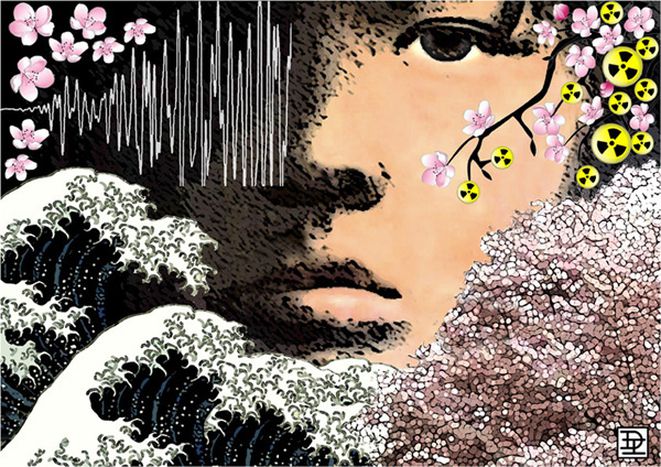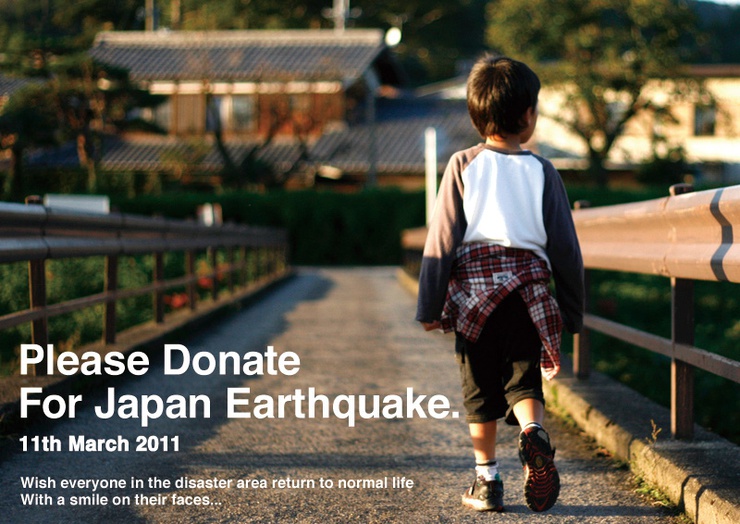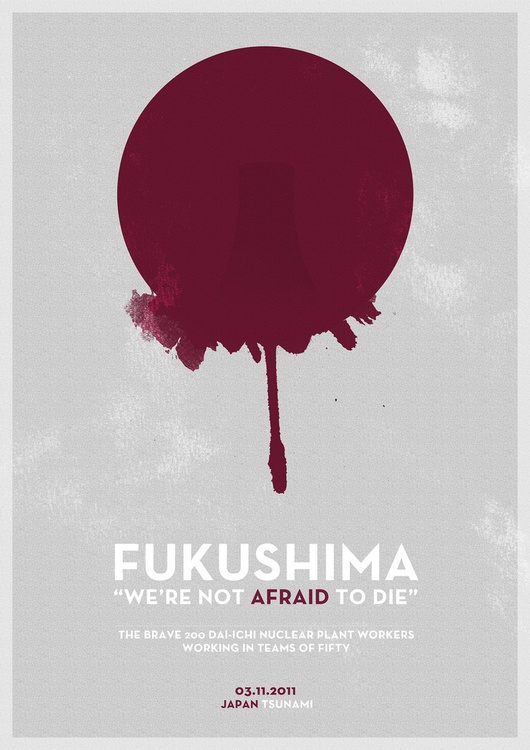
Nuclear psychology: why don’t the Japanese look upset?
Published on
Translation by:
 hkeet
hkeet
No tears, no moaning. Photographs of stupified Japanese people in the middle of ruined buildings following the earthquake and tsunami on 11 March were more reminiscent of the restraint of the samurai than Edvard Munch’s infamous European painting, The Scream. Bernard Bernier, a Canadian specialist, points out the restraint of a society rooted in pride
The Japanese earthquake of 8.9 magnitude and ensuing tsunami in mid-March left the Europeans with many conflicting feelings: terror, compassion, admiration, but also bewilderment and incomprehension. We would like to be able to identify with this nation in mourning and to share its pain, but the images that reach us do not always allow us to do this. Maybe we share our emotions in terms of donations: whilst American solidarity came through at over 20 million dollars by mid-March, the European union and its member states sent 15 million euros as well as goods and rescue missions.
Save who you can, but me first
How do you explain that the Japanese have contained their emotions in face of the drama extremely well, whereas the Europeans can hardly contain an exhausted sigh when they are served coffee that is too cold? First of all, it is difficult to understand these people who walk around the ruins of their homes, telling the story that they have lost a brother, a mother or child without anyone being able to see the slightest trace of emotion in their faces. Secondly, it is difficult to interpret the resignation of these inhabitants in the region of Fukushima who are leaving a land that they may never see again. Thirdly, how to explain why a nation which experienced the atomic horror during world war two can stay so calm when facing a nuclear threat?
Further reading on cafebabel.com: Japan radiation reaches Europe, where 14 states run 143 nuclear plants
From this point of view, we seem to be at least as worried as them. But there was no visible anger in view of the lack of information: no panic, no plundering, no rush to the south or abroad. In stories relayed by the media, the only Japanese people who seem really unsettled are those who are abroad and have friends in Japan, or who can read the international press: they find themselves torn between several cultures that react in opposing ways when facing similar events.

We Europeans tend to easily succumb to extreme feelings in a crisis. In Europe, panic and anger against the authorities are rather more spontaneous reactions. Greece, Portugal, Spain and even the unruffled Brits have recently taken to the streets to protest against their respective governments. Without mentioning the French tendency to complain at the slightest opportunity again, this video captures the profound difference in temperament between the French and Japanese:
 Le Canard Enchaîné (‘The Chained Duck’), a satirical French weekly magazine, told an interesting story in its edition on 23 March. A few days after the first explosion at the nuclear power station in Fukushima, nearly a quarter of the members of the French embassy in Tokyo simply abandoned ship. The head of the secret services and the deputy head of nuclear issues are just two of the people who packed their bags for the south or abroad before changing their minds several days later.
Le Canard Enchaîné (‘The Chained Duck’), a satirical French weekly magazine, told an interesting story in its edition on 23 March. A few days after the first explosion at the nuclear power station in Fukushima, nearly a quarter of the members of the French embassy in Tokyo simply abandoned ship. The head of the secret services and the deputy head of nuclear issues are just two of the people who packed their bags for the south or abroad before changing their minds several days later.
Yet these opposing attitudes do not necessarily reflect a fundamental difference in understanding the disaster. ‘The restraint of the Japanese in public is a real and perceptible element which is explained by education,’ says Bernard Bernier, professor in the department of anthropology and researcher affiliated with the centre for studies of east Asia at the university of Montreal. ‘The Japanese learn to control their emotions from a young age, first of all at home then often at school, where discipline is very strict. But this does not mean they are insensitive. It is possible to reveal one's emotions — sadness and anger, for example — but only in private, at home.’
Samurai suppressed anger
 The Japanese are angry. First of all this anger is directed at those at TEPCO, the company responsible for running the nuclear power station in Fukushima, who were found guilty of arrogance and incompetence. The citizens are also angry at the government, including the overall management of the crisis which is currently under fire from critics. The anger has been reduced by the collective will to keep heads high, but it is still evident from reading blogs and the Japanese press. The Japanese people’s dissatisfaction at their leaders may well show during the next general elections in 2013.
The Japanese are angry. First of all this anger is directed at those at TEPCO, the company responsible for running the nuclear power station in Fukushima, who were found guilty of arrogance and incompetence. The citizens are also angry at the government, including the overall management of the crisis which is currently under fire from critics. The anger has been reduced by the collective will to keep heads high, but it is still evident from reading blogs and the Japanese press. The Japanese people’s dissatisfaction at their leaders may well show during the next general elections in 2013.
Bernard Bernier clears up another myth, of the ‘natural’ character of Japanese temperament. ‘Controlling emotions in Japan has not always been so strict,’ he adds. ‘The elitists who took power from 1848 progressively imposed an ethic of restraint and pride on the entire Japanese society, resulting from the Samurais. It happened gradually during the nineteenth and twentieth century, through the education system. About forty years ago, there was more freedom of speech, especially in some rural areas.’ On the other hand, these reactions that calls out to us, this desire to keep their heads held high, illustrate a nationalism which is indeed real. ‘The ‘we’ vs ‘others’ is the source of the definition of Japanese identity,’ says the Canadian researcher. ‘It is a very restrictive identity, defined by blood and rebellious towards immigration.’ Faced with the tragedy experienced by Japan, Europe reacts as expected: hypersensitively. As we show our emotions freely, we tend to perceive the Japanese as brave — which they are — but also a little insensitive and fatalistic. This is a vision that Bernard Bernier modifies: ‘The Japanese do not supress their emotions. They contain them.’
Images: main (cc) ID-EasyDoor; Japan aid campaign (cc) sorarium; Fukushima (cc) Monster and girls/ all courtesy of Flickr
Translated from Nucléaire et psychologie : les Japonais contiennent leurs émotions...pas nous


